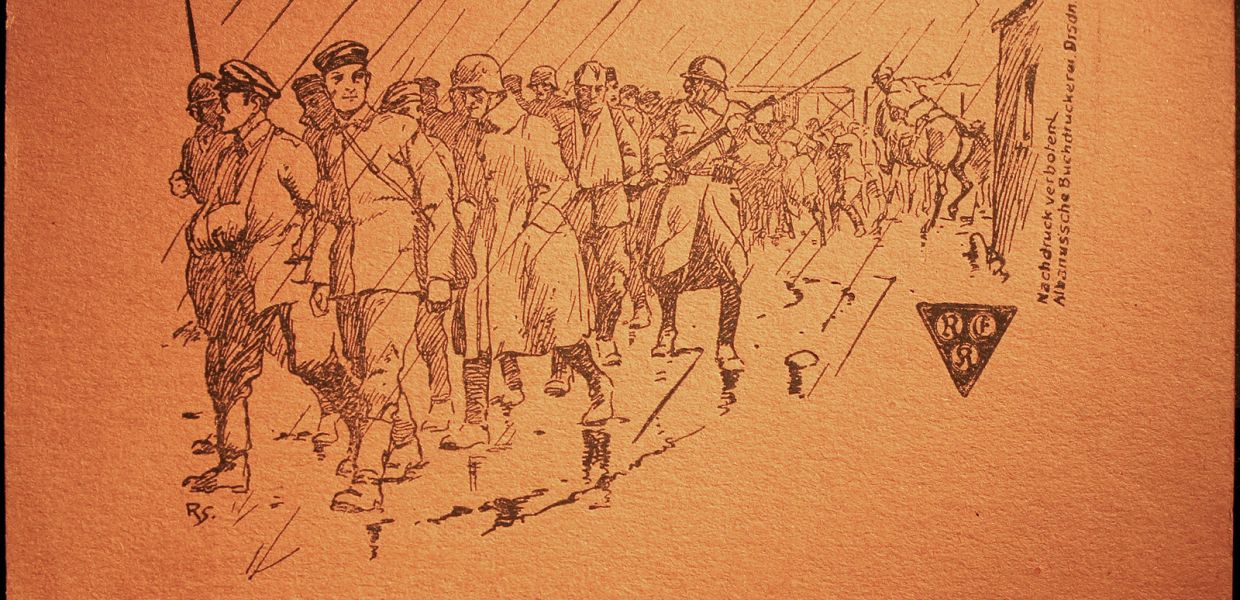From the trenches to the web: World War One centenary event
Europeana brings its Centenary Tour Finale to the House of European History 27-28 November 2018.
From a life-saving bible and a hand-carved violin to handwritten letters from the trenches, the personal stories and objects of European soldiers and their families will be given new life at a two-day event in Brussels to commemorate the centenary of World War One ending. Europeana and the House of European History join together to organise this event which highlights the relevance to the digitisation of these objects to the digital transformation of our society.
At the centre of this commemoration stands the Europe-wide campaign, Europeana 1914-1918. Since 2011, more than 15,000 people from 24 countries have shared family stories and nearly 200,000 items online as part of the campaign, offering a unique perspective of the shared human experience of the conflict.
Harry Verwayen, Executive Director Europeana Foundation said: ‘This collection of letters written in the trenches provide a unique insight into the lives and feelings of the people who wrote them. We are excited to hand these over to the researchers to reveal their untold stories, which can be used and understood by the generations to come.’
Constanze Itzel, House of European History Director said: ‘The way Europeana has been collecting personal stories and items shows just how strongly historical events can affect our own lives. They bear testimony to the many different perspectives according to which European history is experienced. It is extremely valuable for museum work to find this multiplicity of perspectives in just one repository.’
Members of the public from across Europe have been invited to attend the event and take part in a series of activities that reflect on the different ways we can remember the war. Highlights include:
-
The final event of the Europeana Transcribathon 1914-1918 Centenary Tour. Teams from across Europe, including school pupils and pensioners, will compete to digitally transcribe handwritten letters, postcards and diaries written from battle and home fronts so that they can be more widely shared and read by all.
-
European Commissioner for Digital Economy and Society Mariya Gabriel will share why cultural heritage is important to the digital transformation of Europe’s society and economies, and will also present prizes to the winning Transcribathon team.
-
Member of European Parliament and Chair for the Committee on Culture and Education, Petra Kammerevert will share the importance of cultural heritage in education, and will also present prizes to the winning Transcribathon team
-
The new 3D painted animated game 11-11: Memories Retold - animated by Aardman and developed by DigixArt and voiced by Eliahja wood and Sebastian Cox - will be presented by its creators. Telling the story of a Canadian soldier Harry and a German engineer Kurt, the game draws on letters written by and to real life German soldiers and shared on Europeana 1914-18, which helped inspire Kurt’s character and journey.
-
An exclusive physical display curated especially for the event, with Europeana 1914-1918 objects and artefacts from the House of European History collection, including the bible which saved the life of soldier Kurt Geiler, taking a direct hit from a shrapnel as he slept. Shared online by his grandson, Kurt’s bible and his story is now part of the House of European History’s permanent collection.
-
Two panel debates bringing together voices from civil society, the museum world and academia. The panels will reflect on the legacies of World War One and debate how academic research, history exhibitions and social inclusion projects can make remembrance meaningful and engaging for people of all backgrounds and ages.
The event is held in collaboration between the House of European History and Europeana, supported by the European Commission’s DG Connect, and is part of the European Year of Cultural Heritage.
ENDS
Media contacts:
Emily D’Alterio - Europeana Foundation
E: [email protected]
Notes to Editors:
Event details
Programme
Items mentioned
Shell-struck bible
11-11: Memories Retold video game
About Europeana
Europeana is Europe’s platform for digital cultural heritage with a mission to ‘transform the world with culture’. Europeana Collections is Europe’s digital library, museum, gallery and archive. From books, photos and paintings to television broadcasts and 3D objects, Europeana Collections provides online access to a vast store of cultural heritage material from across Europe for everyone to find, use and share: for research, for learning, for creating new things. (@EuropeanaEU)
About the House of European History
The House of European History opened in May 2017 in the European quarter of Brussels. The permanent exhibition galleries offer a unique experience, immersing visitors in the history of the nineteenth and twentieth centuries and an exploration of the development of European integration. Visitors can discover the origins and evolution of Europe, learning about both the continent’s diversity and history’s many interpretations of its story. The learning offer of the museum takes a trans-European viewpoint that explores the historical memories, diverse experiences and common ground of the peoples of Europe and how these relate to the present day. Available in 24 languages, entrance to the museum is free.
About Europeana 1914-18 Collection
Europeana 1914-1918 is a thematic collection that started as a joint initiative between the Europeana Foundation, Facts & Files, and many other European partner institutions. It originates from an Oxford University project in 2008. Since 2011, over 200,000 personal records have been collected, digitised and published. These events have now expanded to over 24 countries across Europe, building up an enthusiastic community of about 9,000 people.
About Europeana 1914-18 Transcribathon
Europeana Transcribathon is a crowdsourcing initiative that allows the public to add their own transcriptions, annotations and geo-tags to sources from Europeana 1914-1918. Developed by Facts & Files and Olaf Baldini, piktoresk, the website is free to use and open to all members of the public. New contributors can now register and submit their own stories within the Europeana Collections site.

